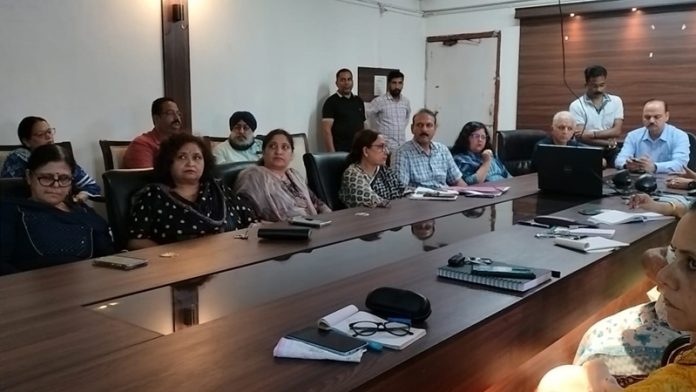Excelsior Correspondent
JAMMU, Aug 24: A crucial meeting on the National Action Plan for Snakebite Envenoming (NAPSE) and preparedness for Monkeypox (Mpox) was chaired today by Dr Rakesh Magotra, Director Health Services (DHS) Jammu.
The meeting was attended by key stakeholders, including officials from the Director Health Services Jammu, Chief Medical Officers, Medical Superintendents of Government Medical Colleges, District Hospitals and Sub-District Hospitals of Jammu Division.
Dr Magotra opened the meeting by emphasizing the critical need for this discussion. The session began with Dr Shehnaz Chowdhary (Medical Officer Epidemiology, DHS Jammu), presenting an overview of NAPSE. She highlighted the plan’s goal to reduce snakebite mortality and morbidity and stressed the importance of coordinated efforts at the state and district levels for effective implementation.
SSO IDSP/Epidemiologist, Dr Harjeet Rai, discussed strategies for implementing NAPSE, particularly in rural and remote areas where snakebites are more frequent. He emphasized the need for enhanced surveillance and real-time reporting of snakebite cases on the IHIP-IDSP portal. Dr Rai also underscored the importance of timely death audits to meet the Sustainable Development Goal (SDG) of halving snakebite deaths by 2030.
Dr Magotra addressed the constraints faced in the field, such as inadequate infrastructure and a lack of trained personnel. He called for improved coordination among health departments and a collaborative approach to address these challenges and achieve NAPSE’s objectives.
Medical Officer Epidemiology (DHS Jammu), Dr Prem Lata, then provided an update on Monkeypox preparedness. She discussed the global status of Monkeypox and the recent declaration of Mpox as a Public Health Emergency of International Concern (PHEIC) by the World Health Organization (WHO). Dr Prem Lata outlined measures for monitoring and controlling Mpox, including case identification, isolation, and public education.
Dr Magotra reiterated the significance of the WHO’s declaration and urged all stakeholders to collaborate in managing risks associated with both snakebite envenoming and Monkeypox. He stressed that the success of these public health initiatives relies on collective community efforts.


